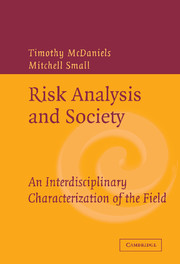Book contents
- Frontmatter
- Contents
- Contributors
- 1 Introduction – Risk Anaysis and Society: An Interdisciplinary Characterization of the Field
- PART ONE FUNDAMENTAL CHARACTER OF RISK
- PART TWO METHODS FOR RISK ASSESSMENT
- PART THREE NEW APPROACHES AND NEEDS FOR RISK MANAGEMENT
- SUMMARY AND FUTURE DIRECTIONS
- 12 State of the Art and New Directions in Risk Assessment and Risk Management: Fundamental Issues of Measurement and Management
- Index
- References
12 - State of the Art and New Directions in Risk Assessment and Risk Management: Fundamental Issues of Measurement and Management
Published online by Cambridge University Press: 05 June 2012
- Frontmatter
- Contents
- Contributors
- 1 Introduction – Risk Anaysis and Society: An Interdisciplinary Characterization of the Field
- PART ONE FUNDAMENTAL CHARACTER OF RISK
- PART TWO METHODS FOR RISK ASSESSMENT
- PART THREE NEW APPROACHES AND NEEDS FOR RISK MANAGEMENT
- SUMMARY AND FUTURE DIRECTIONS
- 12 State of the Art and New Directions in Risk Assessment and Risk Management: Fundamental Issues of Measurement and Management
- Index
- References
Summary
INTRODUCTION
Risk assessment and risk management have grown out of many different intellectual traditions, with many approaches to practice within an array of governance contexts. Over the past few decades, the analytical and managerial approaches to risk have evolved substantially, helping to inspire new methods and directions for future applications. Many views and perspectives are needed to describe risk adequately. Thus, we need common frameworks that will allow comparisons and judgments to be made regarding risk management trade-offs. Changes in society, including the growing complexity of the population and its diversity, the speed with which new technologies are introduced, and the emergence of regional and global economies and new modes of international governance have also altered the ways in which we view risk.
The preceding chapters highlight many conceptual and contextual aspects of risk problems that emerge from the intersection of uncertain outcomes and consequences, and the need to govern in the face of these. In democratic societies, risk problems place particular demands on governance that have substantial implications for how we allocate, use, and manage available resources, products, technologies, and infrastructure. In this concluding chapter, we summarize the relationship between these special demands on governance and some of the enduring themes that have influenced the development of risk analysis as a discipline. We consider as well how these demands have evolved and therefore continue to challenge our core risk concepts, general analytical approaches, and risk management strategies.
- Type
- Chapter
- Information
- Risk Analysis and SocietyAn Interdisciplinary Characterization of the Field, pp. 451 - 458Publisher: Cambridge University PressPrint publication year: 2003



